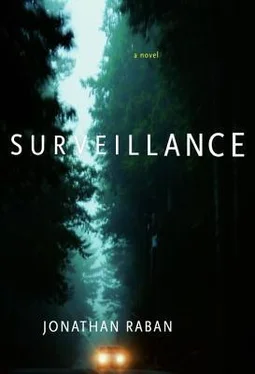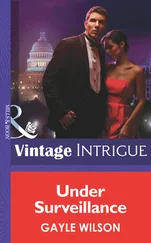“You know what mass panic looks like? Food riots? I tell you, it’s two attorneys, middle-aged guys, in ties and good suits, fighting in the street over a greasy chicken leg. It’s bodies on the sidewalk, rotting garbage, fires, the stink of feces everywhere. And gunfire. You go to sleep to gunfire, you wake up to gunfire. Then it’s just white noise.”
“New Orleans,” Lucy said.
“Yeah, New Orleans. That was a good reminder. Civilization is always just twelve, maybe fifteen hours away from barbarity. Doesn’t matter where you are — could be anywhere, could be Seattle — and less than a day is all it takes to turn a great city into a hellhole. Yesterday you were living in the world’s finest democracy, today’s it’s Mogadishu. The line’s that thin. Which is why we needed New Orleans.
“Trouble is, this country is reliant on a whole series of interlocking networks, and every supply line in every network is so old and brittle and squirrelly — it’s like living in a house full of the latest, most expensive stuff you can buy, but the wiring and the plumbing go back to the days of Theodore Roosevelt. Or before. Think about it: food, water, power — everything has to travel from somewhere else, and everything depends on everything else working. It’s crazy. We’ve got the slowest trains and the most flickery electricity in the western world: someone sneezes in a coal plant in Montana and the lights go out on Whidbey Island.
“It’s democracy. Joe Q. Public isn’t interested in infrastructure, doesn’t want to pay for infrastructure, won’t vote for infrastructure. Who’d vote for a politician who went to the people saying we gotta spend all these billions and billions of federal money on backup systems for these antiquated networks of ours? Can you tell me that?”
“Nobody,” Minna said. “Nobody would.”
Lucy suddenly saw that this was how mealtimes must always be in the Vanags household: Augie launched on a tirade, Minna fueling his rhetorical questions with mechanical answers.
“Right. Which is why we’re so vulnerable to the enemy. And don’t tell me”—he fixed his blue-eyed stare on Lucy as if she were a known dissident—“that our enemy doesn’t know our weakness. He does. It’s what he’s calculating on. He’s perfectly aware that the difference between everything working and nothing working is like that. ” He snapped his middle finger against his thumb. “You really want to injure the United States — hurt us economically, socially, politically, maybe inflict a wound from which we won’t be able to recover — you go for the infrastructure. You don’t have to kill a lot of people. That’s the beauty of it: you just have to put a crimp on one network here, another network there, another over there, and bingo! you’ve got civil unrest, martial law, no food, no power, no water. Plus, you’ve got the biggest world recession in history, because you’ve just brought international trade to a screaming halt. Here, help yourself to Minna’s risotto.”
His smile was that of the conjuror producing the fourth rabbit from his hat.
Poor Minna. Lucy had been watching her while Augie talked. In the soft interior light, seen through the corner of an eye, she was still a beauty, in the ditzy, pliant 1950s mold. A Monroe type. Lucy was always seeing them in supermarket checkout lines, those fifties women, their old girl-faces hardened over the decades into surly masks of pure resentment. They looked cheated. Mouths trained to smile and simper had long given up the effort of appearing pleasant; bodies once dedicated to the pursuit of the hourglass figure had swelled into a sort of aggressive obesity, as if they’d taken to hogging down gallons of ice cream in deliberate revenge for the impossible part they’d been forced to play in the world. But Minna had not let herself go. Her face didn’t have that cheated look. Marriage to Augie must have given her ample cause to hit the Häagen-Dazs, but what should by rights have happened somehow hadn’t. Age had happened, of course, but to see Minna now was to see through a gauze screen the same pretty young bank teller she must have been when August Vanags first walked in with his check forty years or so ago — she’d just gotten blurrier. Lucy wondered whether Minna’s eerie girlishness should be put down to a defect in her character or a strength.
But there was no denying her skill in the kitchen. A gourmet chef might have been proud of Minna’s risotto: firm, moist to just the right degree, complexly flavored and generously laced with baby white asparagus and golden chanterelles that tasted of the woods. “This is genius,” Lucy said. “I wish you’d tell me the secret — whenever I try making risotto it always comes out as lumpy rice pudding.”
“Oh,” Minna said, with a flutter of eyelashes. “Is so simple. In this heat, I think people want only to eat light.”
Viennese, Lucy thought, her voice sounds Viennese.
“See, you don’t need big death tolls.” Augie was regaining command of the table. “Death tolls are good for show and symbolism, but you don’t take down a country this size by killing Americans. You gotta be cleverer than that — and we have a darn clever enemy. Look how he used our own technology against us on 9/11, turning our jetliners into his bombs. We gave him all the weaponry he needed. Only thing he had to supply was his own box cutters. Hey, we’re a generous nation, and we got a whole lot more stuff where those planes came from — computer systems, chemical facilities, power grids, wide-open food-supply chains, water treatment plants, creaky old railroads, and every one of those is a potential weapon if you know how to use it right.”
“He always talks like a terrorist,” Minna said, as if to reassure Lucy that her husband wasn’t improvising his own explosive device.
“No, I think like a terrorist. Somebody has to.”
“It’s the t-t-t-talk of terrorism that t-terrorizes me,” Lucy said, trying to muster her words. “Like these stupid TOPOFF dramas. I hate how the administration plays with us. You know, be scared, be very, very scared — but’s that’s okay, we’ll keep you safe, catch that plane, do that shopping. But watch out for the bogeyman! Sure, we’ll sometimes get acts of terrorism, like in Oklahoma City, but I don’t buy all the smoke and mirrors stuff. It’s so Wizard of Oz. ”
“Ah, you’re a Christian Scientist!” Augie bared his false teeth in an alarming grin.
“No. Why?”
“Mrs. Eddy believed all disease was an illusion. A pity Mrs. Eddy died of pneumonia.”
Lucy bristled at his tone. “I don’t not believe in terrorism. It’s just that there are more threatening things — greenhouse gases, earthquakes, whatever. Like Seattle gets millions of federal dollars for mock terror attacks but can’t raise a federal cent for earthquake exercises, which is what it really needs.”
“Mrs. Who?” asked Minna.
“This is World War IV,” Augie said.
“World War what ?” Lucy laughed. “You lived through World War II, and you seriously compare this to that?”
“I think the situation we’re in now’s as bad as 1939—worse, in a way. The world has changed. People have got to wake up to the complexity, the scale, the global nature of what’s happening. Unless we can win this war, I’m afraid we’re going to see the end of the modern nation-state, which — since I’m not of the anarchist persuasion — I happen to believe would be a catastrophe for mankind. So no, I’m not joking. I don’t think the destruction of our civilization is a laughing matter, funnily enough.”
He spoke in the dry, acidic voice of the classroom, and Lucy remembered Tad’s tight-assed prof who was gung-ho about Vietnam; strange that this victim of war should seem to be such an enthusiast of wars in general. Her glass was empty, and she cast a longing glance at the refrigerator door. “Really? The end of the nation-state?”
Читать дальше












